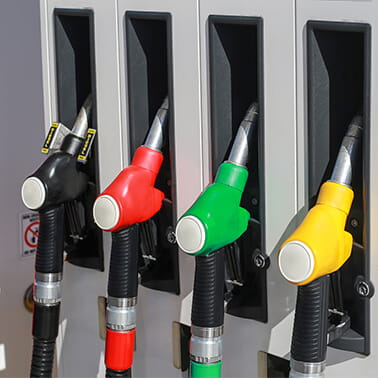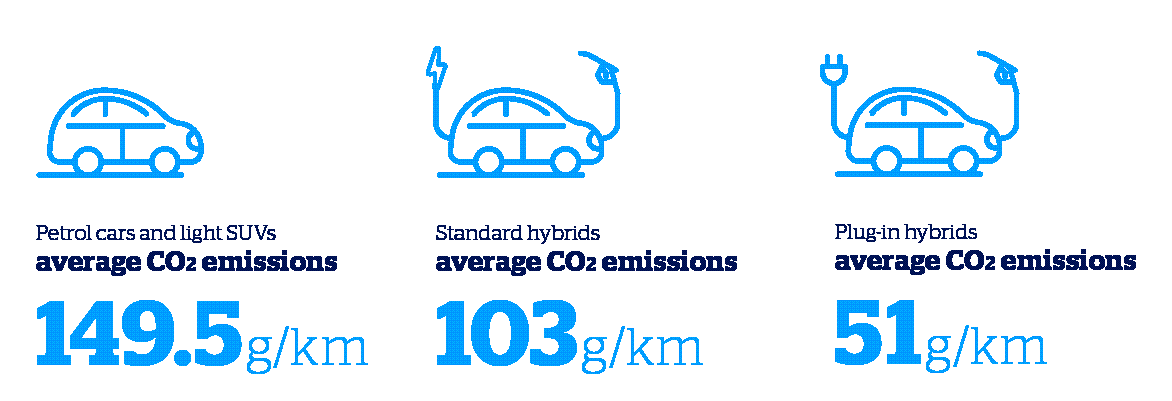Electric cars, hybrid cars and petrol cars: the pros and cons
- For decades, petrol and diesel engines have been the only serious choice – but times are changing
- Hybrid and electric cars are becoming increasingly popular – although they’re generally still more expensive than petrol cars
- Check out our guide to the pros and cons of petrol, diesel, hybrid and electric cars
For years, most mainstream cars have been powered by petrol or diesel. But with increasing awareness of the impact of carbon emissions, combined with evolving electric vehicle (EV) technology, how your next car is powered isn’t as much of a given as it once was.
We take a look under the bonnet to help you make a decision on your next car purchase.
Petrol and diesel cars
Petrol cars have been on our roads since 1886, when Carl Benz’s three-wheeled car revved up its engine for the first time1. And it was Mr Benz, in partnership with Mr Mercedes, who gave diesel its production car debut in 1936 with the Mercedes-Benz 260 D.2
How many petrol and diesel cars are sold each year?
According to the Australian motor car industry database VFACTS, petrol and diesel cars still account for the majority of new car sales. In September 2022, of the 89,385 new vehicles sold in Australia, 47,620 (53 per cent) were petrol and 29,377 (33 per cent) were diesel.3
How much does a new petrol or diesel car cost in Australia?
The average price of a new petrol car in Australia is $37,583, while a diesel-powered car will set you back $57,439.4 Maintenance costs average out at around $1,585 a year.5
Petrol or diesel?

Diesel engines were once seen as longer-lasting and more environmentally friendly, due to their lower Co2 emissions6 – as well as offering a more economical and powerful driving experience.
But due to the particle emissions from diesel vehicles, the tables have turned and the future of diesel in mass-market car production is uncertain7. Several European cities, including Paris, Rome and Oslo, have banned diesel cars from 2024.8
Diesel can usually offer between 30-40 per cent greater fuel efficiency9, and while there’s only one form of diesel, there’s a range of petrol types to choose from.
E10 – a blend of regular unleaded fuel and 9-10 per cent ethanol10 – is usually the cheapest, but it’s less efficient than unleaded petrol (ULP). On average, using E10 increases fuel consumption by three per cent.11
Is premium petrol worth it?
You’ll usually find premium unleaded petrol 95 and 98 available too. They are generally more expensive and promoted as more fuel efficient and able to provide a smoother engine performance.12
But if you have the choice, research in 2019 showed that in terms of fuel efficiency, regular ULP could be the way to go.13
What’s the future for petrol and diesel cars?
Right now, the availability of petrol and diesel cars in Australia is still high – but, as far as the future of petrol and diesel cars is concerned, that’s likely to change over the next decade or so.
Earlier this year, the ACT announced a ban on new petrol and diesel car sales from 203514, and while other states and territories haven’t yet followed suit, it would be no surprise if they did.
Hybrid cars
Bridging the gap between petrol/diesel and electric cars are hybrids, which combine a fuel engine with an electric motor.
Hybrid and plug-in hybrids – what’s the difference?
There are two main types of hybrid cars – hybrid and plug-in hybrid. The difference in how they’re powered is that hybrid cars use their petrol engine and electric motor together or independently, while the plug-in only uses its petrol engine as backup.15
The battery pack in a standard hybrid is relatively small, and provides enough power to drive around at speeds of around 40km/h before the engine kicks in.16 The plug-in hybrid, meanwhile, has a larger battery and can offer around 50km of electricity-powered distance.17
How do hybrid cars generate electricity?
The batteries in plug-in hybrids can be charged via a power point at home or at charging stations.18
Non plug-in hybrid cars create their own electricity when accelerating, idling or through regenerative braking19, which converts kinetic energy back to electrical energy during braking.20
How many hybrid and plug-in hybrid cars are sold in Australia?
According to the motor car industry database VFACTS, 4,616 hybrid cars and 525 plug-in hybrid cars were sold in September 2022. That means, of the 89,385 new car sales that month, five per cent were hybrids, and almost 0.6 per cent were plug-in hybrids.21
How much does a hybrid car cost?
Hybrid cars are usually more expensive than petrol or diesel cars, primarily due to the battery and electric motor needed on top of the combustion engine.22
How much does a hybrid car cost to maintain?
It may cost more to service and maintain a hybrid car, as there’s both the petrol engine and electric motor to work on. While battery packs are typically guaranteed for eight years, their capacity can diminish over time, and it’s often uneconomical to replace a battery in an older hybrid.23
In terms of running costs, fuel costs are similar. A recent test showed a hybrid car would cost $84 less in fuel per year – driving 12,000km – than a comparable petrol car.24
Emissions from a hybrid car
While hybrid cars still produce emissions, they’re better for the environment than their petrol and diesel counterparts. For example, the average emissions of passenger cars and light SUVs is 149.5g/km, while for hybrids it's 103g/km and plug-ins it’s 51g/km.25

Source: CarsGuide
Driving a hybrid car
The driving experience of a hybrid car is similar to a petrol engine. However, there are a few things you can do while driving to get the most from a hybrid car. These include accelerating and braking smoothly and not idling the car in neutral, as this will discharge the battery. When driving, you don’t need to do anything to switch between electricity and petrol – the car does that automatically.26
Hybrid car availability
There’s a decent selection of hybrid models available from all of the major brands, including Toyota, Mitsubishi, Lexus, Kia, Honda and Ford, but you may need to wait. Toyota hybrid cars, RAV4 and Camry, for example, are experiencing ‘lengthening waiting periods’.27
The future of hybrid cars
As they offer a good midpoint between fuel and electric, hybrid car sales are expected to keep on growing until they peak in 2027.28
Electric cars
While electric cars – propelled by a battery – may seem like the new kid on the block, they’ve been around for almost 200 years, with inventors in Europe creating electric carriages and cars as far back as the 1820s.29
The mass production of Henry Ford’s Model T – at a third of the price of electric cars30 – meant the popularity of electric options waned.
It wasn’t until the early-mid 2000s, thanks to advances in technology and lithium-ion batteries31, that the electric car renaissance began.
How many electric cars are sold in Australia today?
According to the motor car industry database VFACTS, 7,247 electric cars were sold in Australia in September 2022. That means, of the 89,385 new car sales that month, eight per cent were electric.32
How do electric cars work?
A battery stores electricity, which is sent to an electric motor and converted into kinetic energy to propel the car.
What are fuel cell electric cars?
Fuel cell electric vehicles use a fuel cell, either instead of, or in combination with a battery or supercapacitor. They are usually powered by hydrogen and can have a greater range than battery-powered electric cars.33
According to the motor industry database VFACTs, there were no fuel cell electric cars sold in Australia in September 2022.34
How do you charge an electric car?
You can charge an electric car from any standard power point35 – although that could take up to 24 hours36. To make electric car ownership viable for everyday drivers, a charging outlet can be installed, which can cut charging times to around four hours.37
Public charging stations are popping up across the country, with standard charging outlets and fast chargers available – fast chargers can charge a car in 40 minutes.38
There are almost 300 fast charging stations and almost 1,600 regular charging stations in Australia. This has increased 85 per cent in two years – and a further 700 charging options are due to be publicly available by 2027.39
Can you convert a petrol or diesel car into electric?
It can be done, particularly for older models which aren’t as complex as more modern cars – however, given the time and costs involved, it’s possibly only really worth considering for classics.40
How much does it cost to buy an electric car?

The average cost of a new electric car in Australia is $47,15641 – almost $10,000 more than the average cost of a petrol car.
How much does it cost to run an electric car?
It’s estimated that electric cars cost 70 per cent less to run per kilometre than other options.42 And maintenance costs are estimated to be around 40 per cent less than a petrol or diesel car.43
How far can electric cars travel in one charge?
Like petrol and diesel cars, it depends on the make and model – and, in the case of electric cars, the battery. For example, at one end of the scale, the Tesla Model S can travel more than 650kms, while at the other end, the Mazda MX-30 can go for 200km.44
What’s it like to drive an electric car?
Electric cars are quieter, and experts say they have a greater technical performance than petrol or diesel cars. The battery is also in the centre of the car, providing a lower centre of gravity.
With no gears to move through, acceleration is faster, while one of the most noticeable differences comes via regenerative braking, which means lifting your foot from the accelerator will bring the car to a complete stop.45
Do electric cars produce emissions?
Electric cars don’t produce any tailpipe emissions, however they may produce emissions via tyre, brake and road wear, as well as indirectly through electricity and battery production.46
How easily can you buy an electric car?
EV supply into Australia is a problem at present, with waiting times of six to 12 months typical for some models.47
What is the future of electric cars?
Despite difficulties getting hold of electric cars right now, the future’s very, very bright.
In Australia, there are major infrastructure plans to place charging stations at intervals of 150km48, while many car manufacturers have said they’ll be discontinuing production of combustion engine cars between 2030 and 2050.49 As infrastructure, technology and supply improves, the future is very much electric.
However your car is powered, you’ll want to make sure it’s covered. Check out QBE’s Comprehensive Car Insurance.
1 https://group.mercedes-benz.com/company/tradition/company-history/1885-1886.html#:~:text=On%20January%2029%2C%201886%2C%20Carl,Patent%20Motor%20Car%2C%20model%20no.
2 https://group-media.mercedes-benz.com/marsMediaSite/en/instance/ko/February-1936-the-diesel-engine-celebrates-its-premiere-in-the-passenger-car.xhtml?oid=9915149#:~:text=Stuttgart%20%E2%80%93%20The%20Mercedes%2DBenz%20260,series%2Dproduction%20diesel%20passenger%20car.
3 https://www.carexpert.com.au/car-news/vfacts-september-2022-sales-rebound-ev-share-hits-new-high
4 https://www.canstarblue.com.au/vehicles/average-car-price/
5 https://data.aaa.asn.au/transport-affordability/
6 https://rac.com.au/car-motoring/info/petrol-vs-diesel-car#:~:text=Diesel%20vehicles%20do%20produce%20much,sold%20in%20Australia%20in%202021.
7 https://haynes.com/en-gb/tips-tutorials/petrol-vs-diesel-what-real-difference
8 https://rac.com.au/car-motoring/info/petrol-vs-diesel-car#:~:text=Diesel%20vehicles%20do%20produce%20much,sold%20in%20Australia%20in%202021.
9 https://rac.com.au/car-motoring/info/petrol-vs-diesel-car#:~:text=Diesel%20vehicles%20do%20produce%20much,sold%20in%20Australia%20in%202021.
10 https://www.nsw.gov.au/driving-boating-and-transport/e10-fuel/e10-facts#:~:text=E10%20is%20a%20blend%20of,increases%20the%20RON%20to%2094.
11 https://www.nsw.gov.au/driving-boating-and-transport/e10-fuel/e10-facts#:~:text=E10%20is%20a%20blend%20of,increases%20the%20RON%20to%2094.
12 https://www.shell.com.au/motorists/go-well-content-hub/four-reasons-to-consider-premium-unleaded-petrol.html
13 https://www.racv.com.au/royalauto/transport/cars/premium-petrol-guzzling-cash.html
14 https://www.smh.com.au/national/australia-news-live-cameron-smith-wins-the-british-open-rising-interest-rates-to-cost-taxpayers-an-extra-13m-20220718-p5b2bm.html?post=p53xpi#p53xpi
15 https://www.carsguide.com.au/ev/advice/hybrid-vs-plug-in-hybrid-whats-the-difference-83034
16 https://rac.com.au/car-motoring/info/hybrid-cars-explained
17 https://rac.com.au/car-motoring/info/hybrid-cars-explained
18 https://www.carsguide.com.au/ev/advice/hybrid-vs-plug-in-hybrid-whats-the-difference-83034
19 https://www.carsguide.com.au/ev/advice/hybrid-vs-plug-in-hybrid-whats-the-difference-83034
20 https://www.sciencedirect.com/topics/engineering/regenerative-brakinghttps://www.sciencedirect.com/topics/engineering/regenerative-braking
21 https://www.carexpert.com.au/car-news/vfacts-september-2022-sales-rebound-ev-share-hits-new-high
22 https://www.motortrend.com/features/cheapest-hybrids/
23 https://rac.com.au/car-motoring/info/hybrid-cars-explained
24 https://www.carsguide.com.au/car-news/will-a-hybrid-really-save-you-money-over-a-petrol-engine-we-compare-the-running-costs-and
25 https://www.carsguide.com.au/ev/advice/are-hybrid-cars-really-better-for-the-environment-86067
26 https://www.maroochydore.kenmillstoyota.com.au/blog/how-to-drive-a-hybrid-efficiently-even-during-peak-hour/3016/
27 https://www.carsales.com.au/editorial/details/how-long-will-i-wait-for-a-new-car-136318/
28 https://www.carsguide.com.au/ev/advice/how-do-hybrid-cars-work-83532#:~:text=Hybrid%20vehicles%20are%20expected%20to,market%20value%20of%20%24792%20billion.
29 https://www.thoughtco.com/history-of-electric-vehicles-1991603
30 https://www.energy.gov/articles/history-electric-car
31 https://www.carsguide.com.au/ev/advice/the-history-of-electric-cars-84562
32 https://www.carexpert.com.au/car-news/vfacts-september-2022-sales-rebound-ev-share-hits-new-high
33 https://arena.gov.au/renewable-energy/electric-vehicles/
34 https://www.carexpert.com.au/car-news/vfacts-september-2022-sales-rebound-ev-share-hits-new-high
35 https://www.greenvehicleguide.gov.au/pages/LowAndZeroEmissionVehicles/ElectricVehicleInformation
36 https://www.drive.com.au/caradvice/how-do-you-charge-an-electric-car-at-home/
37 https://www.drive.com.au/caradvice/how-do-you-charge-an-electric-car-at-home/
38 https://www.drive.com.au/caradvice/how-do-you-charge-an-electric-car-at-home/
39 https://www.whichcar.com.au/news/australia-has-85-per-cent-more-ev-fast-chargers-than-two-years-ago
40 https://www.carsguide.com.au/car-advice/a-guide-to-converting-your-old-car-to-electric-80412#:~:text=In%20a%20word%2C%20yes.,basic%20package%20to%20start%20with.
41 https://www.canstarblue.com.au/vehicles/average-car-price/
42 https://electricvehiclecouncil.com.au/news/top-10-electric-vehicle-myths-busted/
43 https://www.transport.nsw.gov.au/projects/electric-vehicles/why-buy-an-electric-vehicle
44 https://www.drive.com.au/caradvice/electric-cars-australia-2022-longest-range/
45 https://www.transport.nsw.gov.au/projects/electric-vehicles/why-buy-an-electric-vehicle
46 https://www.greenvehicleguide.gov.au/pages/LowAndZeroEmissionVehicles/ElectricVehicleInformation
47 https://techau.com.au/ev-wait-times-in-australia-are-a-big-problem-that-needs-addressing/
48 https://minister.infrastructure.gov.au/c-king/media-release/accelerating-australias-electric-vehicle-potential
49 https://aemo.com.au/-/media/files/electricity/nem/planning_and_forecasting/inputs-assumptions-methodologies/2021/csiro-ev-forecast-report.pdf









